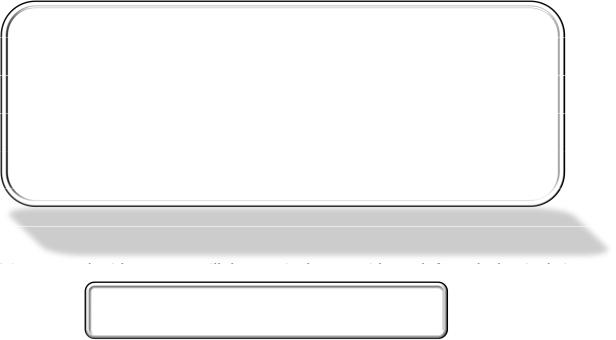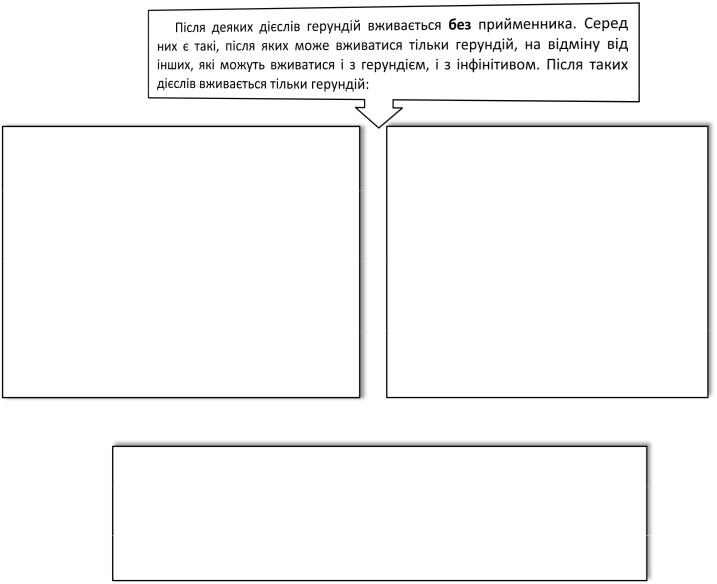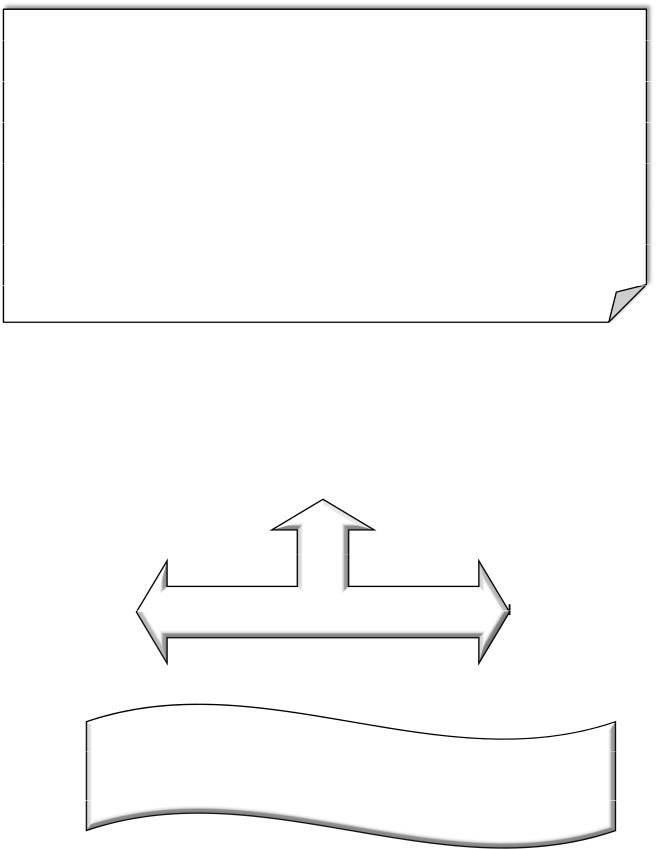
Зошит Англ мова СОЗ 3 курс 2 семестр
.pdf
2. |
You need much _________ or cable pipes with optical fibre. |
|||
|
a. |
currets |
b.ducts |
c. space |
3. |
Conventional cable has much _____________ than optical fibre. |
|||
|
a. capacity |
b.equipment |
c.information |
|
4. |
Conventional cable will cost much to produce in the future than _____________. |
|||
|
a. |
crosstalk |
b. copper cables |
c. optical fibre |
5. |
You need far more equipment, such as ___________ on a copper cable line. |
|||
|
a. |
Interference |
b. repeaters |
c. capacity |
Word check
Capacity – how much something can hold. Ducts/pipes - channels for carrying cables.
To amplify – to increase the strength of the signal. Signal loss – decrease in the strength of the signal. Repeater – type of amplifier.
Interference – a disturbance to the signal caused by unwanted signals. Crosstalk – a type of interference – sounds of another telephone call on the line.
Activity 12. Work with a partner. Fill the gaps in the text with words from the box in their correct form.
In electronics, an integrated circuit, also known as IC or microchip, is a____________________
electronic circuit consisting mainly of semiconductor devices as well as passive components. These circuits are _____________________ on the surface of a thin substrate of semiconductor material. ICs revolutionized the world of electronics and nowadays appear in almost all
________________equipment. Integrated circuits were made possible by discoveries which showed that semiconductor devices could _______________________ the functions of vacuum tubes. Thanks to technological ______________________ in semiconductor device fabrication in the mid 20th century, large numbers of tiny transistors could be integrated into a small chip. This was an enormous __________________________over the manual assembly of circuits. The fact that reliable integrated circuits could be mass produced using a building-block
________________________ in circuit design resulted in the fast adoption of standardized ICs in place of designs using transistors. The cost of integrated circuits is low because of mass production and because much less material is used. Being small and close together, the components switch quickly and_____________________less power than their discrete counterparts. In 2006, chip areas ranged from a few square millimeters to around 350 mm2, with up to 1 million transistors per mm2.
31

Subordinate clauses are phrases that give answers to questions like Why? What ... for?
Why are impurity atoms added to these materials?
Impurity atoms are added in order to influence electrical properties.
Expressions Introducing Subordinate Clauses
∙in order to/so as to + the infinitive of the verb
The properties of the material were changed in order to/so as to improve performance.
∙so that
The properties of the material were changed so that performance improved.
∙for + noun + to + infinitive
For the metal to melt, higher temperatures must be used.
Activity 12. Rewrite the following sentences, using the expressions in brackets.
1.Scientists planned to make possible the development of integrated circuitry. That's why they introduced semiconductors. (in order to)
______________________________________________________________________
2.The audience stayed in the lecture hall because they wanted to be able to hear the second lecture. (so that)
3.Researchers added impurities, because conductivity had to be optimized. (so as to)
4.Circuit breakers were installed, because one did not want the system to overload. (for ...
to ...)
Home task: _____________________________________________________________________
Заняття 6.
Тема Герундій. Вживання герундія. Телекомунікації
Герундій — єдина дієслівна форма, перед якою може вживатися, прийменник. Тому герундій вживається після дієслів, прикметників і виразів, які вимагають додатка з прийменником:
Thank you for telling me. Дякую, що ви сказали мені.
She couldn’t keep from crying. Вона не могла стриматися, щоб не заплакати. I am fond of reading. Я люблю читати.
32

а) to avoid уникати;
to finish закінчувати;
to suggest пропонувати;
to leave off, to give up переставати щось робити;
to go on, to keep on продовжувати; cannot help не можу не (робити чогось).
В українській мові після відповідних дієслів вживається інфінітив:
We finished dressing. Ми закінчили одягатися. They went on talking. Вони продовжували
розмовляти.
I cannot help asking. Я не можу не запитати.
б) to enjoy діставати задоволення; to excuse, to forgive вибачати;
to put off, to postpone відкладати, to delay затримувати; відкладати;
to fancy уявляти (в окличних реченнях); to mind заперечувати (вживається в
питальних і заперечних реченнях).
В українській мові після відповідних дієслів вживається іменник або підрядне речення:
I don’t mind telling you.
Я не проти того, щоб розповісти вам. Fancy going for a walk in such weather!
Уявіть собі прогулянку в таку погоду!
в) to want, to need, to require потребувати. Після цих дієслів герундій вживається в активному стані з пасивним значенням. В українській мові після цих дієслів вживається Іменник або інфінітив у сполученні з словами треба, потрібно:
The house wants repairing.
Будівля потребує ремонту (треба відремонтувати).
33

Герундій або інфінітив вживається після дієслів:
to begin, to start починати; |
to continue продовжувати; |
|
to propose запропонувати; |
to like любити; |
|
to try намагатися; |
to refuse відмовлятися (щось зробити); |
|
to intend мати намір; |
to forget забувати; to prefer віддавати перевагу: |
|
The children began playing. |
|
Діти почали гратися. |
Then they began to whisper. |
|
Тоді вони почали говорити пошепки. |
She continued sitting motionless. |
Вона продовжувала сидіти нерухомо. |
|
He continued to live with his parents. Він продовжував жити із своїми батьками.
У деяких випадках значення дієслова змінюється залежно від того, чи вжито воно з інфінітивом чи герундієм.
Так, дієслово to stop у сполученні з герундієм означає перестати щось робити, а в сполученні з інфінітивом — зупинитися, щоб щось зробити:
They stopped reading the notice. |
Вони перестали читати об'яву. |
He stopped to read the notice. |
Він зупинився, щоб прочитати об'яву. |
Герундій вживається як безприйменниковий додаток до прикметників like схожий, busy
зайнятий, WORTH вартий:
She was busy translating the article. Вона була зайнята перекладом статті.
They were not worth looking at. |
На них не варто було дивитися. |
I don’t feel like working. |
У мене нема настрою працювати. |
Activity 1. Translate into Ukrainian.
1.I understand perfectly your wishing to start the work at once.
2.At last he broke the silence by inviting everybody to walk into the dining room.
3.On being told the news she turned pale.
4.The place is worth visiting.
5.Can you remember having seen the man before?
6.After being corrected by the teacher, the students' papers were returned to them.
Activity 2. Put the verbs in brackets in the right form.
1.Перестаньте розмовляти.
2.Продовжуйте обговорювати цей експеримент.
3.Ви не проти того, щоб відчинити вікно?
4.Ми дістали задоволення від проведення експерименту.
5.Я не могла не погодитися з ним.
6.Вона кинула палити.
7.Директор уникала зустрічі з ним.
34

8. Ми відкладемо обговорення типів цих кабелів.
Activity 3. Make sentences from the notes.
►Tessa / want / buy / a new coat / soon
Tessa wants to buy a new coat soon.
1.we / must / avoid / waste / so much time
2.sometimes / a country / refuse / take part / in the Olympics
3.I / like / see / the Rocky Mountains / some day
4.I / mean / give / Judy / a nice welcome / yesterday
5.I / always / like / see / my doctor / once a year
6.the buses / usually / stop / run / before midnight
7.I / can't face / get up / at five / tomorrow
8.last year / we / make / an agreement / work / together
Sometimes we can use an ing-form after the preposition.
|
PREPOSITION |
ING-FORM |
|
I apologized |
for |
making |
a mistake. |
Laura is keen |
on |
taking |
photos. |
I'm thinking |
of |
going |
to Turkey. |
Are you interested in |
traveling |
around? |
|
We're tired |
of |
not having |
a place to live. |
Activity 4. Complete the conversation between Claire and her sister Sophie. Put in the verbs with these prepositions: for, in, like, of, on
Sophie: Where's that little radio of yours?
Claire: Oh, it got broken. Henry knocked it off the table.
Unfortunately he hasn't succeeded (►) in getting (get) it to work again.
35

Sophie: Oh, what a pity.
Claire: It was only a cheap thing. In fact I'd been thinking (1) ___________________ (buy) a new one. But Henry not only apologized (2) ______________________________ (break) it, he insisted (3)___________________ (buy) me a much nicer one. It's in the dining-room.
Sophie: Henry is such a gentleman.
Claire: He didn't really need to buy me a new one, but I didn't feel (4)________________ (argue).
VOCABULARY Practise the following words and word combinations
There are three main methods of electromagnetic signal transmission: wire, radio and optical.
wire transmission amplify
attenuation
coaxial cable
copper wire
metallic-pair circuit
multipair cable
open-wire pair
repeater
restore
retransmit
single-wire line
radio transmission
antenna
dish
electromagnetic wave
microwave
radio wave
receiver
reflected propagation
satellite
surface propagation
transmitter
transponder
optical transmission
fibre optic cable
high bandwidth
interference immunity
laser
lightweight
light-emitting diode (LED)
low attenuation
low cost
wavelength
36
Activity 5. Read and translate the text.
Telecommunications technology transmits information by electromagnetic means over media such as telephone wires or radio waves. The information may be voice, facsimile, data, radio, or television signals. The electronic signals that are transmitted can be either analogue or digital. The advantages of digital transmission are high reliability and low cost. Digital switching systems are much cheaper than analogue systems.
In analogue modulation, the signals are transmitted directly (without converting them to digital form) by amplitude modulation or frequency modulation. For digital transmission the analogue signals must be converted to a digital form. Then the digitized signal is passed through a source encoder, which reduces redundant binary information. After source encoding, the digitized signal is processed in a channel encoder, which introduces redundant information that allows I errors (degradation by noise or distortion) to be detected and corrected. The encoded signal is made suitable for transmission by modulation onto a carrier wave. When a signal reaches its destination, the device on the receiving end converts the electronic signal back into an understandable message - sound on a telephone, images on a television, or words and pictures on a computer.
Activity 6. Match each of the following words with its definition.
1. |
Wire |
a) a device which maps the binary strings into coded bits or waveforms |
||||||||||||||||||||
|
|
|
|
|
|
|
for transmission |
|
|
|
|
|
|
|
|
|
|
|
||||
2. |
wave |
b) a device which maps the source into a set of binary strings |
||||||||||||||||||||
3. |
digital |
c) |
a system in which data is represented as 0 or 1 |
|
|
|
||||||||||||||||
4. |
analogue |
d) a system in which data is represented as a continuously varying |
||||||||||||||||||||
|
|
|
|
|
|
|
voltage |
|
|
|
|
|
|
|
|
|
|
|
|
|
|
|
5. |
amplitude |
e) a thin |
piece |
of |
metal |
for |
conducting |
electrical |
current a wave |
|||||||||||||
|
modulation |
|
|
suitable for modulation by an information-bearing signal an electric, |
||||||||||||||||||
|
|
|
|
|
|
|
electromagnetic, acoustic, mechanical or other form whose physical |
|||||||||||||||
|
|
|
|
|
|
|
activity rises and falls as it travels through a medium |
|||||||||||||||
6. |
frequency |
f) |
the deterioration in quality, level, or standard of performance |
|||||||||||||||||||
|
modulation |
|
|
|
|
|
|
|
|
|
|
|
|
|
|
|
|
|
|
|||
7. |
source encoder |
g) to fail to reproduce accurately the characteristics of the input |
||||||||||||||||||||
8. |
channel encoder |
h) where audio signals increase and decrease the amplitude of the |
||||||||||||||||||||
|
|
|
|
|
|
|
carrier wave |
|
|
|
|
|
|
|
|
|
|
|
|
|||
9. |
degradation |
i) |
where voltage levels change the frequency of a carrier wave |
|||||||||||||||||||
10. |
distort |
j) |
a device which maps the binary strings into coded bits or waveforms |
|||||||||||||||||||
|
|
|
|
|
|
|
for transmission |
|
|
|
|
|
|
|
|
|
|
|
||||
11. |
carrier wave |
k) a device which maps the source into a set of binary strings |
||||||||||||||||||||
|
|
|
|
|
|
|
|
|
|
|
|
|
|
|
|
|
|
|
|
|
|
|
|
|
|
1 |
|
2 |
|
3 |
|
4 |
|
5 |
|
6 |
7 |
|
8 |
|
9 |
|
10 |
11 |
|
|
|
|
|
|
|
|
|
|
|
|
|
|
|
|
|
|
|
|
|
|
|
|
37

Telecommunications is the fastest growing segment of technology today. Telecommunications technologists are needed to plan, install and maintain state-of-the-art telephone systems, cable TV and computer networks. Although technologists have knowledge of theoretical topics, they tend to focus on solving practical design and application problems. Training covers a wide range of telecomsrelated topics. Here is the content from one such course:
Part 1: Operating Systems
Part 2: Analogue Communications
Part 3: Telecommunications Fundamentals
Part 4: Telecommunications Fundamentals Lab
Part 5: Digital Electronics
Part 6: Telecommunications Networking
Part 7: Fundamentals of Optical Communications
Part 8: Data Communications Networking
Activity 7. The following words are taken from three modes of transmission: wire, radio and optical. Link each term with the most appropriate mode of transmission.
antenna |
coaxial cable |
copper wire |
|
fibre optic cable |
laser |
light-emitting diode |
microwave |
repeater |
|
satellite |
single-wire line |
transmitter |
wavelength |
|
Wire
Radio
Optical
Activity 8. The following extract is taken from a description for a telecommunications technology course. Complete die text by choosing a suitable word or phrase from the box.
sharing |
laser information electromagnetic transmission |
|
direct |
converting analogue |
transmit signals |
38

TELECOMMUNICATIONS TECHNOLOGY CERTIFICATE COURSE
COURSE NAME |
COURSE DETAILS |
|
Telecommunications |
Introduction to the __________________ |
|
Fundamentals |
of information |
|
Telecommunications |
Hands-on practical experiments to ______________ |
|
Fundamentals Lab |
____________ |
|
Analogue Communications |
______________ transmission of signals. |
|
Digital Electronics |
____________________ |
signals. |
Fundamentals of Optical |
The advantages of ______________ |
|
Communications ____ |
technologies |
|
Fundamentals of |
Introduction to ____________ information. |
|
Telecommunications Networking |
|
|
Data Communications Networking |
Sharing ____________ between networks. |
|
Home task: _______________________________________________________________________
Заняття 7.
Тема Герундій. Вживання герундія. Телекомунікації like схожий
busy зайнятий |
Герундій вживається як безприйменниковий |
вартий |
|
додаток до прикметників |
|||
|
|
She was busy translating the article. They were not worth looking at.
I don’t feel like working.
Вона була зайнята перекладом статті. На них не варто було дивитися.
У мене нема настрою працювати.
39

Запам’ятайте дієслова і вирази, що вимагають після себе герундія з певними прийменниками.
to insist on |
|
to give up the idea of |
|
|
|
|
|
to look forward to |
|
to agree to |
|
to object to |
|
to approve of |
|
to persist in |
|
to be afraid of |
|
to prevent from |
|
to congratulate on |
|
|
|
|
|
to succeed in |
|
to depend on |
|
|
|
|
|
to suspect of |
|
to dream of |
|
to thank for |
|
to feel like |
|
to think of |
|
to accuse of |
|
|
|
|
|
Activity 1. Translate into Ukrainian.
1.My friend succeeded in translating this difficult text.
2.He gave up the idea of ever hearing from her.
3.We are looking forward to seeing you again.
4.He has always dreamt of visiting other countries.
5.He persisted in trying to solve that difficult problem.
6.They accuse him of having robbed the house.
7.He never agreed to their going on that dangerous voyage.
8.He did not approve of her drinking so much coffee.
Activity 2. Translate into English.
1.Нарешті вони перестали обговорювати це питання.
2.Вона заперечувала, що відправила факс.
3.Відкладімо цю ділову поїздку до наступного тижня.
4.Пробачте, що я загубив вашу ручку.
5.Коли вона закінчить свою промову?
6.Я не заперечую проти того, щоб залишитися вдома і попрацювати над моїм перекладом.
7.Він не може мені пробачити те, що я випадково видалив його файл.
8.Чи не могли б ви дати мені книжку, коли закінчите її читати?
9.Він не міг не думати, що його робітник зробив велику помилку.
40
